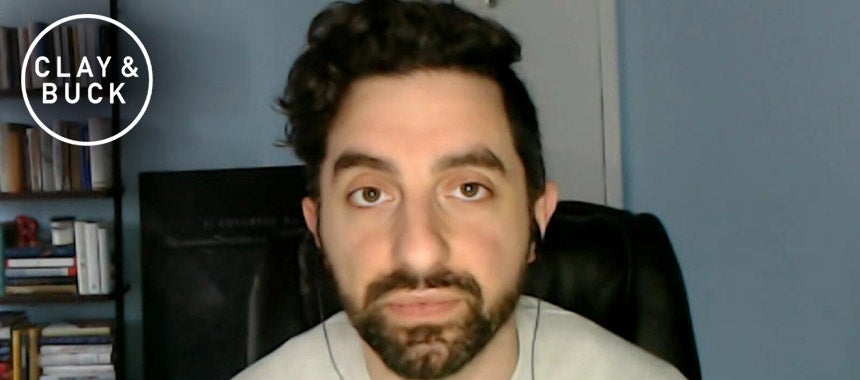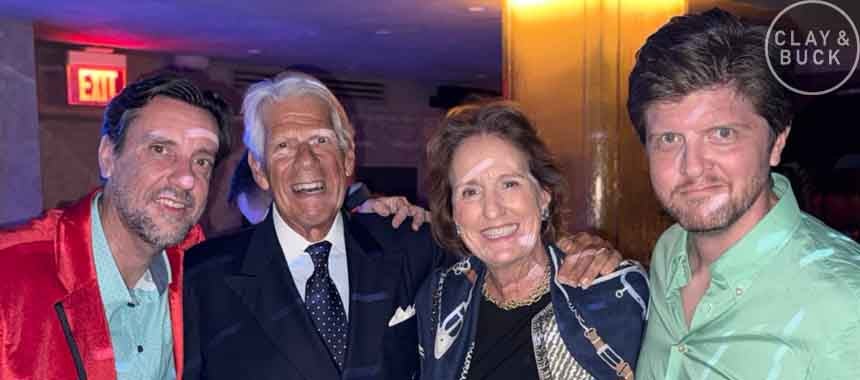Supposedly Tough Guy Mayor Admits He’s Afraid to Take Subway
19 Jan 2022
MAYOR ERIC ADAMS: Our system must be safe. It must be safe from actual crime, which we are going to do, and it must be safe from those who feel as though there’s a total level of disorder in our subway system. Day one, January 1 when I took the train, I saw the homelessness, the yelling, the screaming early in the morning, crimes right outside the platform.
We know we have a job to do, and we’re going to do both. We’re going to drive down crime, and we’re going to make sure New York is still safe in our subway system. And they don’t feel that way now. I don’t feel that way when I take the train every day or when I’m moving throughout our transportation system. That is our battle, and that is what I’m going to do as the mayor of the City of New York.
BUCK: Welcome back to the Clay and Buck show. Just mention to you, when we talk about our crime discussion before, Eric Adams, the new mayor of New York City, a former member of the NYPD, the police department here in New York, saying some of the right things. And at least this is something of a counterbalance to the new district attorney, Bragg, who came into the firestorm after he put out a memo — the firestorm of outrage — for saying that they won’t even pursue criminal charges for things like armed robbery, which everyone usually would say, that’s a real serious crime.

You’re pointing a gun at somebody, saying, “I’m gonna kill you unless you give me your money,” that usually results in a lengthy should result in a lengthy prison sentence. So, I mean, there’s some cause for… I wouldn’t say optimism, but it’s not hopeless in New York, Clay. That’s where I am now. I’m not optimistic, but it’s not hopeless the crime situation here in NYC will turn around and remember the New York crime miracle was often used as a template and a playbook for what was done in other cities across the country.
But it’s also a reminder, remember he says that the subway, when he’s in it — and a lot of people listening, I’m sure, have been on the New York subway at some point. It’s gone through good periods, bad periods. It has become totally normalized that you’ll walk into a subway car and it will… I mean, it will honestly smell like you’re in a sewage-treatment plant and there will be trash all over the place and some absolutely insane person who’s maybe not even dressed who is walking around screaming profanity and talking to himself, and you’re just supposed to say, “Well, I guess the cops… You know, he has a right to do this. The cops can’t arrest him.” This is the society we’ve been living in.
CLAY: I believe that crime is up 50% on the subway so this is not something that people are making up. I read that statistic recently, and I would also say this. Some of what Eric Adams says there is important, and I think some of the things that he has said about the importance of diminishing crime in the city is a hundred percent correct. But he’s a grown man, Buck. You’re a grown man. I’m a grown man.
The level of fear that I think a grown man feels is different than the level of a fear that a woman would feel or certainly a child would feel. So I would take the subway and not be afraid to take the subway myself. Simultaneously, if I were living in New York right now, I would not want my wife going on the subway by herself — she’s five foot two, 105 pounds — and I certainly wouldn’t want my kids.
I’m about to have a 14-year-old. I don’t want my teenage son to be on the subway by himself. So to me, you judge the safety of a city, Buck, not by what a grown man of a normal size who feels like he can take care of himself to some degree and also at least puts off the idea to a criminal element, “Hey, if I try to do something to this guy, we’re similar in size; there may be some danger to me.” I want to know what women and kids think about whether they feel safe, not when a grown mayor who can probably take care of himself ’cause he’s a grown man.
He’s not really the arbiter for whether a subway is safe to me. It’s whether women and children feel comfortable and, as a man — whether you’re the dad or you’re the husband or you’re the grandfather — whether you would feel comfortable with the women in your life and the children in your life being on the subway. And, Buck, you don’t have a wife or kids right now, but I bet you wouldn’t feel very comfortable if you knew that they were on the subway by themselves right now. I certainly wouldn’t. That’s, to me, how you test safety in a city.
 BUCK: Oh, absolutely. Absolutely. I remember a friend of mine when I lived in D.C. did some real estate investing. He had this theory, and he said, “You know, if you want to know,” ’cause he would invest in transitioning — economically transitioning — neighborhoods. He’d say, “All you have to know is do women jog at night in this neighborhood.”
BUCK: Oh, absolutely. Absolutely. I remember a friend of mine when I lived in D.C. did some real estate investing. He had this theory, and he said, “You know, if you want to know,” ’cause he would invest in transitioning — economically transitioning — neighborhoods. He’d say, “All you have to know is do women jog at night in this neighborhood.”
CLAY: Perfect. Yes.
BUCK: He said if women jog at night who live there who know the neighborhood, you’re fine. If women don’t feel safe jogging at night, there’s an issue. It’s a very simplistic thing, but I think it actually is true.
CLAY: I’ve made that exact analogy before, Buck. To me, if you… In Nashville where we lived, we lived in an inner-city neighborhood, and I said, you know, “You can tell how a neighborhood is in terms of safety by what women feel comfortable doing alone by themselves in the neighborhood.” That’s the ultimate test because if a woman feels like she can put on shorts and a T-shirt and go out and jog in that neighborhood, it is a 100% sign that the neighborhood is in some way safe, right?
Your average woman. If they don’t, then that’s a big issue. And I think in the wake of that woman who was by herself getting shoved in front of the subway and dying and the stories that are coming out of violence inside the subway, I don’t think most women in New York City feel that safe by themselves.
BUCK: The perception issue really matters when you’re talking about safety as well, when you think about — and I know I’m focusing on New York, and we’ve got audience all across the country, and a lot of them don’t live in cities and crime is not a big issue for you. So you are among the fortunate Americans that don’t think about this very much. But I’m sure you’ve probably got kids, maybe, who are in college or who have moved to big cities because that’s where the jobs often are.
So it affects everybody in different ways, and I just say that when you see — and I was in Los Angeles before lockdown. The weekend before lockdown I was on the Bill Maher show in L.A. and I remember being out there, and you go to Hollywood, and there are tent cities. I went to Austin during the lockdowns, and there are tent cities out on the street. And the perception among a certain lifestyle lib has been, if you complain about this, you’re a bad person.
And depending on the socioeconomic and racial background of some of people living in the tent cities, you may even be kind of racist for complaining about this reality, when in truth we all know there is a tremendous correlation between vagrancy, the lack of and reformatory of these laws, these day-to-day laws, and the increase in crime.

We just know that if you allow people who are… You know, Clay, I didn’t tell you this. The place where I film the TV show that I do for the First TV every day is right across the street, like, it faces one of those hotels that was turned into essentially a homeless shelter, and it was turned into a homeless shelter during the pandemic because of the emergency orders. They were paying, I want to say, something like $150-$200 a night, the city was, to house homeless people in this hotel.
And out in front, the place was just an absolute mess. I mean, there was trash everywhere, people doing not just weed, all kinds of drugs. It was loud, people smashing bottles, people yelling profanity, people urinating on the streets and, you know, you’re allowed to as a citizen — as a person who’s living here, law-abiding, paying taxes — you’re allowed to say, why is this permissible? And now finally I think people are waking up to that in New York, Los Angeles —
CLAY: San Francisco, certainly.
BUCK: — Atlanta, Chicago, name a city that’s been. Philadelphia? Good heavens, look what’s going on there. So that’s the big change. The Democrats realize that it’s all over for them with this, “Oh, we have to end the carceral state.” This is insane.
CLAY: As I’ve been saying for a long time, Buck, being concerned about being too tough on crime is a luxury of a low-crime environment. We’re not in a low-crime environment anymore. We don’t have the luxury of worrying about over-punishing criminal elements. We need to get back to putting violent people behind bars so we can start to protect the innocent people in society.
Recent Stories

Ryan Girdusky: Illegal Immigrant Births Drop, Affordability Debate Rises
Our data guru shares insights on newly released data.

Photos and Video: Buck & Carrie's Christmas Party
Enjoy festive highlights from Buck and Carrie's Miami Christmas party.

Carrie's Dad Makes Final Flight as American Airlines Pilot
Congratulations on retirement, Captain Joe Flatley!

U.S. Seizes Oil Tanker Off Venezuela -- Is Regime Change Next?
How far will President Trump go militarily?






